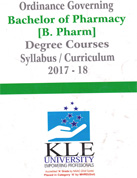B. Pharm
To be at forefront of Pharmaceutical Education and Research by
- Manifesting Excellence
- Stimulating Evolutionary Progress
- Engaging the Society we Serve
- To impart quality Pharmacy education to cater to the evolving needs of the students, industries, and the society at large.
- To be a learning organization with a commitment to learn, adapt and change as a means to continuous improvement.
- To foster and disseminate high quality research and creative work which enhances learning and contributes to the advancement of knowledge.
- To produce highly productive professionals and leaders to serve the health care needs of the society.
- To build an active and response relationship with industries, alumni, and the society.
Program Edu Obj(PEOs):
Upon completion of the B. Pharm. program, graduates will be:
- Proficient in sourcing, preparation, manufacturing and therapeutic usage of medicines.
- Highly productive professionals/ collaborators/innovators/entrepreneurs/leaders to serve the Pharmaceutical Industry and Health care needs/challenges of the society.
- Responsible graduates with integrity and ethical values.
- Pharmacy Knowledge:
Possess knowledge and comprehension of the core and basic knowledge associated with the profession of pharmacy, including biomedical sciences;pharmaceutical sciences; behavioral, social, and administrative pharmacy sciences; and manufacturing practices.
- Planning Abilities:
Demonstrate effective planning abilities including time management,resource management, delegation skills and organizational skills. Develop and implement plans and organize work to meet deadlines.
- Problem analysis:
Utilize the principles of scientific enquiry, thinking analytically, clearly and critically, while solving problems and making decisions during daily practice. Find, analyze, evaluate and apply information systematically and shall make defensible decisions.
- Modern tool usage:
Learn, select, and apply appropriate methods and procedures, resources, and modern pharmacy-related computing tools with an understanding of the limitations.
- Leadership skills:
Understand and consider the human reaction to change, motivation issues, leadership and team-building when planning changes required for fulfillment of practice, professional and societal responsibilities. Assume participatory roles as responsible citizens or leadership roles when appropriate to facilitate improvement in health and well being.
- Professional Identity:
Understand, analyze and communicate the value of their professional roles in society (e.g. health care professionals, promoters of health, educators, managers, employers, employees.
- Pharmaceutical Ethics:
Honor personal values and apply ethical principles in professional and social contexts. Demonstrate behavior that recognizes cultural and personal variability in values, communication and lifestyles. Use ethical frameworks; apply ethical principles while making decisions and take responsibility for the outcomes associated with the decisions.
- Communication:
Communicate effectively with the pharmacy community and with society at large, such as, being able to comprehend and write effective reports, make effective presentations and documentation, and give and receive clear instructions.
- The Pharmacist and society:
Apply reasoning informed by the contextual knowledge to assess societal, health, safety and legal issues and the consequent responsibilities relevant to the professional pharmacy practice.
- Environment and sustainability:
Understand the impact of the professional pharmacy solutions in societal and environmental contexts, and demonstrate the knowledge of, and need for sustainable development.
- Life-long learning:
Recognize the need for, and have the preparation and ability to engage in independent and life-long learning in the broadest context of technological change. Self assess and use feedback effectively from others to identify learning needs and to satisfy these needs on an ongoing basis.
Duration of Courses
The course is of four academic years (spread over 8 semesters) and the course is of three academic years (6 semester) for lateral entry students.
Minimum Qualification For Admission
- Passed 10+2 examination with Physics and Chemistry as compulsory subjects along with one of the Mathematics/Computer Sciences/Biotechnology/Biology. Obtained at least 45% marks in the above subjects taken together.
- For lateral entry in 2nd year B.Pharm for D.Pharm candidates passed from an AICTE approved institution with at least 50% marks.
- 5% relaxation in Minimum eligibility criteria for SC/ ST category.
Curriculum Outline
Ist Sem. B.PHARM
Human Anatomy & Physiology-1
Pharmaceutical Analysis-I
Pharmaceutics-I
Pharmaceutical Inorganic Chemistry
Communication Skills*
Remedial Biology/Mathematics*
*Non University Examination (NUE)
IInd Sem. B.PHARM
Human Anatomy & Physiology-II
Pharmaceutical Organic Chemistry-I
Biochemistry
Pathophysiology
Computer Applications in Pharmacy*
Environmental Sciences
IIIrd Sem. B.PHARM
Pharmaceutical Organic Chemistry-II
Physical Pharmaceutics-I
Pharmaceutical Microbiology.
Pharmaceutical Engineering
IV th Sem. B.PHARM
Pharmaceutical Organic Chemistry-III
Medicinal Chemistry-I
Physical Pharmaceutics-II
Pharmacology-I
Pharmacognosy and Phytochemistry-I
Vth Sem. B.PHARM
Medicinal Chemistry-II
Industrial Pharmacy-I
Pharmacology-II
Pharmacognosy and Phytochemistry-II
Pharmaceutical Jurisprudence
VI th Sem. B.PHARM
Medicinal Chemistry-III
Pharmacology-III
Herbal Drug Technology
Biopharmaceutics and Pharmacokinetics
Pharmaceutical Biotechnology
Quality Assurance
VII th Sem. B.PHARM
Instrumental Methods of Analysis
Industrial Pharmacy-II.
Pharmacy Practice
Novel Drug Delivery System
Pracitce School*
VIII th Sem. B.PHARM
Biostatistics and Research Methodology
Social and Preventive Pharmacy
Pharmaceutical Marketing (ES)
Pharmaceutical Regulatory Science (ES)
Pharmacovigilance (ES)
Quality Control and Standardization of Herbals (ES)
Computer Aided Drug Design (ES)
Cell and Molecular biology (ES)
Cosmetic Science (ES)
Experimental Pharmacology (ES)
Advanced Instrumentation Technique (ES)
Dietary Supplements and Nutraceuticals (ES)
Project Work




